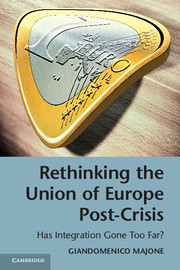Book contents
- Frontmatter
- Contents
- List of abbreviations
- Introduction: varieties of regional integration
- 1 Monetary union as a metaphor
- 2 A political culture of total optimism: its rise and fall
- 3 Integration and its modes
- 4 Deepening integration: transaction costs and socio-political limits
- 5 European integration and the decoupling of politics and economics
- 6 From the democratic deficit to a democratic default? The normative dimension of the euro crisis
- 7 ‘More Europe’
- 8 The limits of leaderless Europe
- 9 Integration through cooperative competition
- 10 The nation state between globalization and regional integration
- Bibliography
- Index
7 - ‘More Europe’
Published online by Cambridge University Press: 05 May 2014
- Frontmatter
- Contents
- List of abbreviations
- Introduction: varieties of regional integration
- 1 Monetary union as a metaphor
- 2 A political culture of total optimism: its rise and fall
- 3 Integration and its modes
- 4 Deepening integration: transaction costs and socio-political limits
- 5 European integration and the decoupling of politics and economics
- 6 From the democratic deficit to a democratic default? The normative dimension of the euro crisis
- 7 ‘More Europe’
- 8 The limits of leaderless Europe
- 9 Integration through cooperative competition
- 10 The nation state between globalization and regional integration
- Bibliography
- Index
Summary
The crisis as opportunity
‘“More Europe” is a mindless slogan, not the answer to all problems’ wrote Samuel Brittan in the Financial Times (2011). The solution to problems, the noted publicist went on, is not more Europe, but less. Integrationist leaders naturally think otherwise. Some of them even see the sovereign-debt crisis of the euro zone as a blessing in disguise – a unique opportunity to complete the process started with monetary union with full political and economic union. In the words of the German finance minister, Wolfgang Schaeuble, as reported by the International Herald Tribune (Castle and Erlanger 2011): ‘In recent months it has become clear: the answer to the crisis can only mean more Europe. . .Without. . . further steps toward stronger European institutions, eventually Europe will lose its effectiveness. We have to look beyond the national state.’ Other members of the Berlin government, possibly including the Chancellor herself, seem to share the view that the crisis could, paradoxically, bring the EU much closer to a political union. The crisis, they argue, cannot be resolved without a much tighter coordination of the fiscal and social policies of the members of the euro zone, even if this implies additional limits on national sovereignty. Also the leader of the opposition Social-Democratic Party, Sigmar Gabriel, is of the opinion that the crisis calls for political union.
Some intellectuals are even more radical than the politicians. Sociologist Ulrich Beck claimed that the euro crisis was actually a great opportunity (Beck 2009). Two years later Beck went as far as suggesting that the ‘predictable problems’ of monetary union without political union were anticipated and even intended by the fathers of monetary union as a way of forcing national governments to move towards closer political integration. In an article in The Guardian (Beck 2011) he went as far as hailing the crisis as an ‘opportunity for democracy’. Not even the worsening economic conditions of members of the euro zone like Greece, Portugal, Spain, and Italy have dissuaded Beck from the vision of the euro crisis as the instigator of a Habermasian ‘Europe of the Citizens’.
- Type
- Chapter
- Information
- Rethinking the Union of Europe Post-CrisisHas Integration Gone Too Far?, pp. 208 - 235Publisher: Cambridge University PressPrint publication year: 2014

